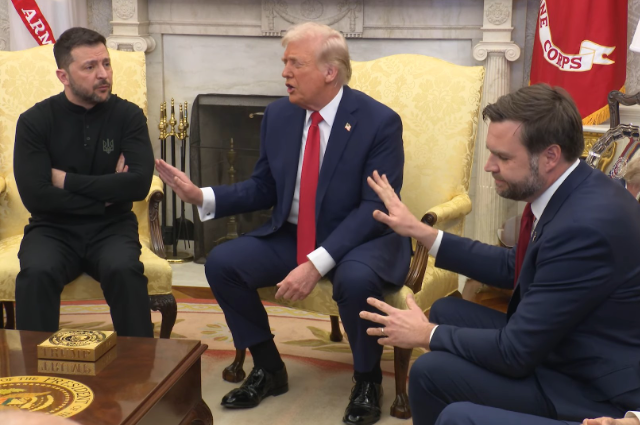In what was expected to be a pivotal diplomatic meeting, U.S. President Donald Trump and Ukrainian President Volodymyr Zelenskyy met in the Oval Office on February 28, 2025. However, what began as an effort to strengthen ties and discuss peace negotiations quickly unraveled into a tense exchange that ended with Trump abruptly dismissing Zelenskyy and canceling a scheduled press conference.
The confrontation has sparked intense debate, with Trump and his allies accusing Zelenskyy of ingratitude and obstructionism. But a closer look at the situation reveals a more complex reality—one where Zelenskyy’s firm stance was not just justified but necessary.
A Peace Deal at What Cost?
At the heart of the dispute was Trump’s push for Ukraine to engage in peace talks with Russia—talks that, according to sources, would have required significant concessions from Kyiv. Trump warned Zelenskyy that he was "gambling with World War III," a statement that underscored the high-stakes nature of the discussion.
For Zelenskyy, however, the issue was not about avoiding negotiations but ensuring that any agreement did not come at the expense of Ukraine’s sovereignty. The Ukrainian leader has been consistent: a rushed peace deal, dictated under pressure, risks legitimizing Russia’s aggression and leaving Ukraine vulnerable to future attacks. History supports this caution—past agreements, such as the 2014 Minsk Accords, failed to prevent further Russian incursions.
The Question of Gratitude
Throughout the meeting, Vice President J.D. Vance and Trump repeatedly suggested that Zelenskyy was not sufficiently appreciative of U.S. military and financial support.
"You’re not acting all that thankful," Vance reportedly told him.
But this argument oversimplifies the nature of U.S.-Ukraine relations. Supporting Ukraine is not merely an act of charity; it is a strategic investment in global stability. By resisting Russian expansionism, Ukraine is effectively holding the front line against an adversary that has shown ambitions beyond its borders. The security of Europe, and by extension the United States, is tied to Ukraine’s ability to defend itself.
Moreover, Zelenskyy has consistently expressed gratitude to the American people and its leaders. After the meeting, even as he canceled a planned speech at the Hudson Institute, he reiterated his appreciation for U.S. support while maintaining that Ukraine’s sovereignty was not up for negotiation.
A Diplomatic Misstep by Trump?
The fallout from the meeting was swift. Within hours, European leaders, including French President Emmanuel Macron and NATO Secretary-General Mark Rutte, reaffirmed their unwavering support for Ukraine. Leaders from Canada, Poland, Spain, and Moldova echoed similar sentiments, signaling concern over Washington’s handling of the talks.
Trump’s decision to cut the meeting short and dismiss Zelenskyy from the White House raised eyebrows among diplomats. While the former president has long favored a more transactional approach to foreign policy, publicly confronting a wartime leader who enjoys broad bipartisan support in Congress could prove to be a costly miscalculation.
At a time when the U.S. seeks to maintain influence on the global stage, alienating key allies—especially one in active conflict—risks undermining Washington’s credibility.
What Comes Next?
Zelenskyy’s government must now navigate an increasingly complex diplomatic landscape, ensuring continued support from its Western allies while maintaining its commitment to an independent, secure Ukraine. The breakdown of this high-profile meeting suggests that Kyiv may need to look beyond Washington for additional military and economic backing, potentially deepening ties with European nations that have reaffirmed their support.
For now, one thing is clear: despite intense pressure, Zelenskyy refused to be coerced into a deal that could jeopardize his country’s future. Far from being ungrateful, his stance was a necessary defense of Ukraine’s sovereignty—one that history may judge as the right call.

